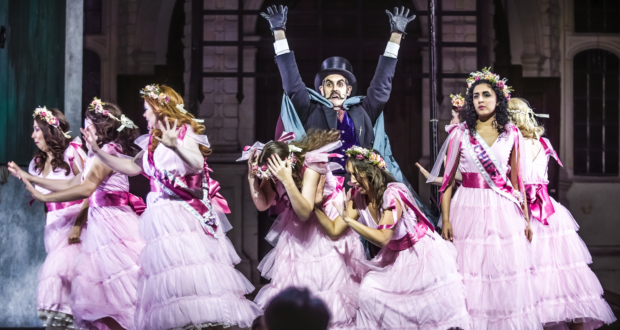The spooks have it in this perky staging of a classic.Summary
Rating
Good
Ruddigore had no easy birth into this world. Taking to the stage after The Mikado’s record run of over 670 shows, it was met with a mix of applause and booing. After similar steady successes in HMS Pinafore and The Pirates of Penzance, Ruddigore is a bold choice for Charles Court Opera and Opera Holland Park’s third co-production. Thankfully, over a hundred years of theatrical tradition have come to hand to iron out this difficult show.
Taking place in the fictional Cornish fishing town of Rederring (groan), Sir Ruthven Murgatroyd has succeeded in passing down a hereditary title and its accompanying curse to his brother Sir Despard Murgatroyd. Now undercover, he lives as a farmer trying to woo the etiquette freak, Rose Maybud. What ensues is a brief comedy of manners whereby Rose temporarily ends up with Ruthven’s foster-brother and then Ruthven and then the foster-brother again, when he reveals Ruthven’s identity to Despard, for reasons nobody has quite been able to follow for now 136 years. Restored as Baronet Murgatroyd and reminded by a chorus of ghosts, Ruthven gets about committing one crime per day lest he succumb to the curse.
Gilbert and Sullivan never quite managed to get it right; the former’s copies of the libretto are scarred with various scorings out and amends, and the latter’s music has been subject to full blown chops as well as regular tweaking since the opening night. Charles Court Opera’s Musical Director and conductor David Eaton is the latest to have a go, and (having had plenty of practice) has made a nifty reduced orchestration for Opera Holland Park’s loan of 16 of the City of London Sinfonia’s players. There are some neat tricks, a ‘well hardly ever’ call-back to Pinafore is inserted into act one, hornpipe music is a cute cameo, and the melodrama is restored in act two, as a piano reduction gives a great sense of parlour room farce. Conducting from a pit in the centre of the stage, Eaton responds to the cast and his orchestra well in this difficult, airy setting.
John Savournin is both director and Despard. His direction gives the show a lively and perky air, which nearly overcomes a lack of rake and bad lighting determined to flatten out any moments upstage. Particular attention has rightly been drawn to the act one finale and an excellent ‘When the Night Wind Howls’ which are both excellent camp and high, silly fun. It’s G&S by the book.
The production is well sung throughout and the spooks really have it in tonight. Heather Lowe as Mad Margaret hauls in massive applause; she manages an excellent spooky air and is delightful to listen to. Likewise, Stephen Gadd is an incredibly chilly, blood curdling force in Sir Roderic Murgatroyd; he and Heather Shipp (Dame Hannah) make the most of their duet, the opera’s only tender moment and we’re touched for a moment.
Conducted by: David Eaton
Directed by: John Savournin
Design by: – Madeleine Boyd
Lighting Design by: Mark Jonathan
Choreography by: Merry Holden
Produced by: Charles Court Opera and Opera Holland Park
This show has now completed its current run.
 Everything Theatre Reviews, interviews and news for theatre lovers, London and beyond
Everything Theatre Reviews, interviews and news for theatre lovers, London and beyond



